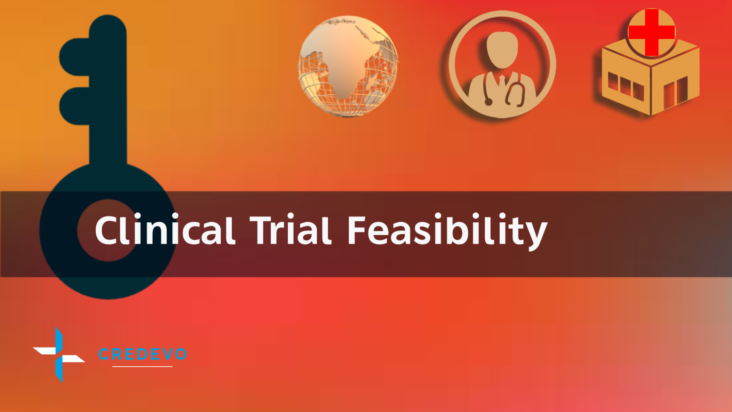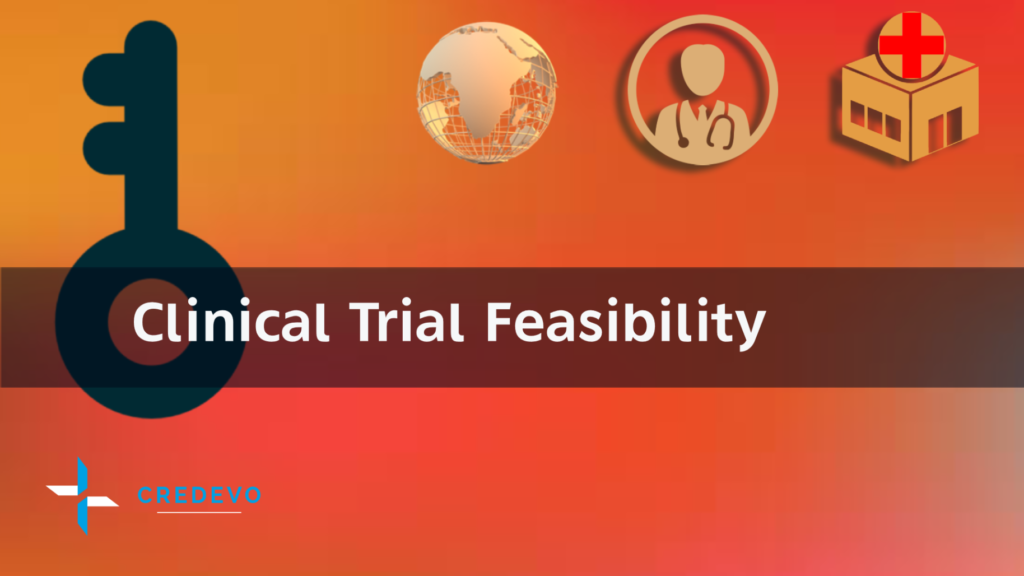Clinical Trial Feasibility – Important Tool Before You Conduct Clinical Trial

Conducting clinical trial feasibility is one of the first and crucial steps involved in any clinical study process. Clinical trial feasibility helps in assessing the potential of investigators, the country’s potential for conducting the trial, and many more aspects involved to execute a clinical trial successfully.

Clinical trial feasibility
Clinical trial feasibility is an assessment process to project likely scenarios if a clinical trial is conducted in a geographical region, site, or with certain investigators. This also helps create the most favorable path for successful project completion in terms of timelines, targets, and cost.
Importance of conducting clinical trial feasibility
It’s estimated that more than 90% of clinical trials fail due to poor patient recruitment, inefficient clinical investigator selection, improper region preference, poor understanding of ethical and local regulatory aspects of the selected site and region for conducting the study, time delay, and cost incurred due to delays.
- Conducting clinical trial feasibility minimizes these burdens incurred due to wrong assumptions and misinterpretations.
- Clinical trial feasibility helps in identifying these challenges before taking a step forward.
- Clinical trial feasibility also helps in identifying and understanding region-specific or even site/institution-specific practices and capabilities which can have an impact on various clinical trial performance metrics.
Significance of conducting clinical trial feasibility
Feasibility studies are useful in all industries, including healthcare. Clinical trial feasibility examines the practicability of a clinical trial project in a defined scenario.
Clinical trial feasibility is one of the best tools in understanding and predicting the investigator and site performance, patient recruitment potentials, scenarios in a region/country, and estimating the overall timeline and cost of study conduct.
Here are a few aspects that significantly impact clinical trial conduct and completion.
Appropriate country for your clinical trial
The process of selecting a region (country) with a sufficient number of quality sites and investigators is one of the most challenging tasks in conducting clinical trials. Proper region selection can not only impact the financials and monitoring resources requirements but can also affect the credibility/acceptance of the data generated from the clinical trial.
Projecting prospective scenarios helps assess the number of eligible patients for participation in the trial. This further improves the process of selection of country/region for conducting the clinical trials.
Qualified investigators and sites for your clinical trial
Careful selection and evaluation of investigator & site are crucial for a successful clinical trial to complete within the estimated budget, proposed timelines, and for the generation of high-quality data.
All sites or investigators may not fulfill the clinical trial requirements or be efficient to make the trial successful. Sites should demonstrate their ability to recruit the required number of patients in the agreed recruitment period.
Patient recruitment for your clinical trial
More than 80% of clinical trials in the United States fail to meet their patient recruitment timelines and approximately one-third (30%) of phase III study terminations are due to enrollment difficulties. These delays increase costs, deplete resources, and prolong the time to enter the market.
By executing a sound clinical trial feasibility assessment, it’s possible to preempt the likely scenario in patient recruitment and make preparations to manage the challenges.
What outcomes can we expect from clinical feasibility?
Geography, Investigator & Site
With well-designed feasibility, the sponsor will be able to predict the country’s performance in the proposed clinical trial in terms of regulatory, patient pool, disease prevalence, availability of efficient investigators/sites, timelines, and budget aspects.
Based on the investigator’s response and participation in clinical trial feasibility sponsor shall compare various critical aspects for a clinical trial such as
- Investigator’s clinical trial experience,
- Patient recruitment tract of the investigators/sites,
- Clinical trial site infrastructure (staff, equipment, etc),
- Clinical trial feasibility questionnaire comparisons and
- Various timelines for clinical trial completion (contract period, recruitment period, etc.)
Foresight into clinical trial timelines / quality / cost aspects
Successful clinical trial feasibility shall determine and give foresight of timelines based on the site available for conducting the trial (initiation period), recruitment period, recruitment rate, and treatment period.
It’s also possible to assess from clinical trial feasibility, the possible quality of data at a particular site. Investigator’s experience, availability of trained technical clinical trial staff, site facilities help create a foresight of quality data that can be produced.
Rare disease – Clinical trial feasibility
Clinical trial feasibility plays a very important role in clinical trials for rare diseases.
Crucial steps to begin a successful clinical trial for the rare disease are often given as
- Choosing a country with a highly relevant patient population
- Identifying qualified investigators and sites with access to patients, and
- Recruiting patients
Their impact in the clinical trials for rare diseases is often considered more important due to factors of the special patient population, fast patient recruitment, and agility required in clinical trial execution.
A thoughtful design coupled with well-executed clinical trial feasibility leading to efficient clinical investigator selection goes a long way in developing a realistic scenario for conducting successful clinical trials for rare diseases. Such measures help sponsors in assessing the scenario before actually conducting clinical trials to save time and costs efficiently.
A traditional process to clinical trial feasibility
Conventionally, a typical clinical trial feasibility process involves
- Shortlisting prospective regions/countries
- Building a database of prospective investigators and sites in each region
- Developing a list of questions to be answered (Feasibility Questionnaire)
- Contacting investigators and sites with the preliminary information
- Getting responses from sites on clinical trial feasibility questionnaire (FQ)
- Compiling regulatory and procedural details, including timelines
- Preparing a comprehensive clinical trial feasibility report
Practically, this process may take considerable effort and time (a few days to several months).
Due to the complexity of this process and the time required, many site start-up teams (generally responsible for feasibility) tend to skip over some critical steps.
For example,
choosing to go only with sites their database – potentially missing new investigators.
Or, skipping procedural details – inviting potential risks to timelines and whole project viability.
To avoid these hassles and still assess feasibility quickly, here are some smarter ways.
Smarter ways to clinical trial feasibility
You can fast track your feasibility with one or more of the following ways
- Access ready database of investigator and sites
- Utilize ready professionally designed clinical trial feasibility questionnaire
- Perform web-based clinical trial feasibility
- Get access to readily available clinical trial feasibility reports
Access clinical trial investigator database / clinical trial site database
It saves a lot of time and cost by taking the help of readily available clinical trial investigator databases. These are prepared based on the experience and utilizing professional efforts.
With Credevo, it’s possible to reach out to more than 110,000 clinical trial investigators across 25 countries.
➥Find a clinical trial investigator with Credevo
Get ready clinical trial feasibility questionnaire (FQ)
It makes the process lot simpler and easier if you have a ready professionally designed clinical trial feasibility questionnaire available.
Credevo provides a readily available FQ format for use in your feasibility studies.
➥Download clinical trial feasibility questionnaire format
Perform web-based clinical trial feasibility
Conducting clinical trial feasibility, just with few easy steps and making it time and cost-effective are the hallmarks of a web-based clinical trial feasibility process. This is made possible with modern information technology tools and experienced clinical research professionals.
Credevo offers a world-class online feasibility process for assessing clinical trial feasibility in almost all countries.
➥Try online clinical trial feasibility assessment
Get access to readily available clinical trial feasibility reports
What faster way to expedite the clinical trial feasibility process than getting access to an already prepared feasibility assessment report?
Credevo makes some clinical trial feasibility reports available for everyone to download and utilize
➥Download ready clinical trial feasibility reports
We invite you to discuss with our feasibility experts about your specific clinical trial needs.
Contact Credevo or just send us a message through social media or other means (links are given below).
Contact Credevo team via Credevo.com
For more information on the clinical trial feasibility questionnaire, click here, or explore Credevo’s works and free knowledge support through articles
Contact or follow Credevo on social media: LinkedIn, Twitter, Facebook
4 thoughts on “Clinical Trial Feasibility – Important Tool Before You Conduct Clinical Trial”
Comments are closed.